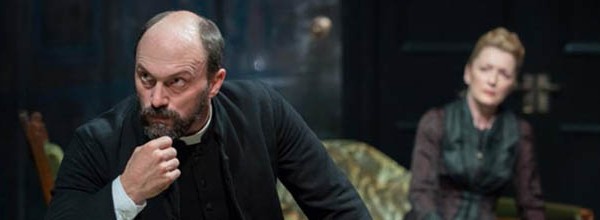Already a highly successful production, and this week nominated for Evening Standard awards in the direction and leading actress categories, Ghosts confirms that Ibsen is a writer of particular resonance, and relevance, to modern audiences. Carrie Cracknell’s lauded production of A Doll’s House – a play awarded the accolade, in 2006, of being the world’s most performed – is en route to Broadway, having recently ended its transfer engagement at the Duke of York’s, while a year ago, at the Old Vic, Sheridan Smith made for a memorably petulant and self-absorbed Hedda Gabler.
Where Ibsen is concerned, it is not just the ghosts onstage you have to worry about, but those of all the actors and productions past that have imprinted these plays in the public consciousness. Still, if anyone is up to the challenge of exorcising them, it’s director Richard Eyre and actress Lesley Manville, who have each made a lifetime’s study of the kind of theatre which unextravagantly and directly illuminates truth.
As Mrs Alving, Manville is the caged and wounded heart of this play – a woman whose commitment to duty and to other people’s ideas of social propriety has infected not only her life, but, for all her best efforts, the life of her estranged son, Oswald, too.
Oswald’s return to the family home is one of the twin catalysts that power the action – the other being the building, and imminent opening, of an orphanage in the name and memory of his late father. Both events, Mrs Alving instinctively knows, are time bombs, and seeing her journey from defiant rebuking of the past to desperate impotence in the face of its legacy is what gives the play, still, its electric charge. Throughout the action, the insistent rain drizzling outside the window becomes an auditory reminder of her claustrophobia.
There are no shortage of hypocrites and deceivers. As Jacob Engstrand, Brian McCardie takes advantage of the translation’s vigorous vernacular energy to present a Scots-brogued Jacob Engstrand: a fox, in his own amoral way, more honest than the hens he stalks. Meanwhile, Will Keen, as Pastor Manders, is a model of passive-aggression, a man of moral evasiveness, and with a fine line in deception of himself and others. It is excruciating to witness the damage done by Manders’s flimsily-justified sanctimony – so much so that when Mrs Alving asserts that, ‘God and the law – there you have the cause of all the misery in the world’, one’s sympathies are firmly with her.
But the tragedy of the play, for its characters, is that truth, and truth-telling come too late, leading to a brutal and devastating final image of sunrise, which is very far from an image of hope.
It is an accomplished, and rightly acclaimed, production; but if any one element lingers most strongly in the memory, it is the performance of Lesley Manville, whose authority and subtlety mark her out as one of our finest Classical actresses.
Time may be short, but if there is a ghost of a chance, you would be advised to catch this before it closes.
![]()
Performed on Monday 7 October 2013 at the Almeida in London.

